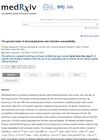 September 2020 in “Research Square (Research Square)”
September 2020 in “Research Square (Research Square)” Certain genes influence immunoglobulin levels in Chinese Holstein cows, which can improve calf health.
 15 citations,
December 2017 in “Journal of Investigative Dermatology”
15 citations,
December 2017 in “Journal of Investigative Dermatology” No strong genetic link to other skin conditions was found, but some genetic factors may make people more likely to get seborrheic dermatitis.

PCOS has a strong genetic basis, but more research is needed to fully understand it.
April 2023 in “Medizinische Genetik” Male-pattern hair loss is largely influenced by genetics, with key genes identified.
 64 citations,
March 2017 in “Nature communications”
64 citations,
March 2017 in “Nature communications” Researchers found 63 genes linked to male-pattern baldness, which could help in understanding its biology and developing new treatments.
 40 citations,
June 2013 in “Scientific Reports”
40 citations,
June 2013 in “Scientific Reports” A gene variant in KRT71 causes the curly fur in Selkirk Rex cats.
 1 citations,
January 2017 in “Evolutionary studies”
1 citations,
January 2017 in “Evolutionary studies” Different human traits like skin color and hair type vary between populations due to genetic adaptations to the environment.
 111 citations,
October 2008 in “Nature Genetics”
111 citations,
October 2008 in “Nature Genetics” Researchers found a new gene area linked to male-pattern baldness, which, along with another gene, significantly increases the risk of hair loss in men.
 29 citations,
January 2021 in “Translational Psychiatry”
29 citations,
January 2021 in “Translational Psychiatry” The research suggests that Tourette syndrome is linked to both brain signaling and immune system pathways.
 November 2024 in “medRxiv (Cold Spring Harbor Laboratory)”
November 2024 in “medRxiv (Cold Spring Harbor Laboratory)” Genetic factors affecting skin health and body weight may increase the risk of dermatophytosis.
 9 citations,
February 2022 in “Nature communications”
9 citations,
February 2022 in “Nature communications” Rare changes in the KRT82 gene are linked to a higher risk of Alopecia Areata.
 78 citations,
August 2012 in “Human molecular genetics online/Human molecular genetics”
78 citations,
August 2012 in “Human molecular genetics online/Human molecular genetics” A new gene, JMJD1C, may affect testosterone levels in men.
 58 citations,
June 2018 in “Scientific reports”
58 citations,
June 2018 in “Scientific reports” Researchers found 15 new genetic links to skin traits in Japanese women.
 43 citations,
November 2018 in “Nature Communications”
43 citations,
November 2018 in “Nature Communications” Genetic variations affecting skin structure play a key role in severe acne.
 308 citations,
December 2018 in “PLOS Genetics”
308 citations,
December 2018 in “PLOS Genetics” The research found that PCOS has common genetic factors regardless of how it is diagnosed and is linked to metabolic and reproductive issues.
30 citations,
November 2019 in “Genetics selection evolution” Chinese domestic goats have unique genetic traits due to domestication and geographic isolation.
 December 2021 in “The Journal of clinical endocrinology and metabolism/Journal of clinical endocrinology & metabolism”
December 2021 in “The Journal of clinical endocrinology and metabolism/Journal of clinical endocrinology & metabolism” Men can have genetic risks for PCOS-related traits like obesity and diabetes.
 58 citations,
December 2018 in “Nature Communications”
58 citations,
December 2018 in “Nature Communications” Male pattern baldness is mostly inherited, involves many genes, and is linked to other traits like early puberty and strong bones.
 57 citations,
November 2017 in “Nature Communications”
57 citations,
November 2017 in “Nature Communications” Researchers found 71 genetic regions linked to male pattern baldness, which account for 38% of its genetic risk.
 247 citations,
August 2011 in “European Journal of Epidemiology”
247 citations,
August 2011 in “European Journal of Epidemiology” The Rotterdam Study updated its design and objectives in 2012, providing insights into various diseases in the elderly, including skin cancer, bone health, liver disease, neurological and psychiatric conditions, and respiratory issues.
234 citations,
November 2009 in “American journal of human genetics” Common variants in the Trichohyalin gene are linked to straight hair in Europeans.
 43 citations,
December 2020 in “PLOS Genetics”
43 citations,
December 2020 in “PLOS Genetics” New method finds genetic links between Type 2 Diabetes and Prostate Cancer not seen before.
 4 citations,
November 2017 in “Scientific Reports”
4 citations,
November 2017 in “Scientific Reports” The research provides a gene-based framework for hair biology, highlighting the Hippo pathway's importance and suggesting links between hair disorders, cancer pathways, and the immune system.
 March 2024 in “medRxiv (Cold Spring Harbor Laboratory)”
March 2024 in “medRxiv (Cold Spring Harbor Laboratory)” Recent selection on immune response genes was identified across seven ethnicities.
 336 citations,
August 2015 in “European Journal of Epidemiology”
336 citations,
August 2015 in “European Journal of Epidemiology” The Rotterdam Study found risk factors for elderly diseases, links between lifestyle and genetics with health conditions, and aimed to explore new areas like DNA methylation and sensory input effects on brain function.
1 citations,
January 2023 in “Frontiers in genetics” Certain genetic markers linked to wool quality in Rambouillet sheep were identified, which can guide better breeding choices.
 September 2023 in “Nature Communications”
September 2023 in “Nature Communications” Rare genetic variants in five specific genes are linked to male-pattern hair loss but only account for a small part of the risk.
 1 citations,
May 2023 in “Frontiers in Endocrinology”
1 citations,
May 2023 in “Frontiers in Endocrinology” Autism's genetics are linked with early age of puberty and less hair loss, but not with hormone levels or polycystic ovary syndrome.
 September 2023 in “The Journal of clinical endocrinology and metabolism”
September 2023 in “The Journal of clinical endocrinology and metabolism” Genetic risk for PCOS can affect children's growth, metabolism, and development from early life into adulthood.
 March 2019 in “Journal of Investigative Dermatology”
March 2019 in “Journal of Investigative Dermatology” Seborrheic dermatitis is influenced by diet, genetics, and psychological factors.


























